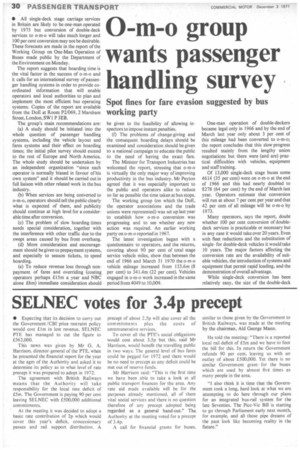03-m-o group wants passenger handling survey
Page 32

If you've noticed an error in this article please click here to report it so we can fix it.
Spot fines for fare evasion suggested by bus working party
• All single-deck stage carriage services in Britain are likely to be one-man operated by 1975 but conversion of double-deck services to o-m-o will take much longer and 100 per cent conversion may not be desirable. These forecasts are made in the report of the Working Group on One-Man Operation of Buses made public by the Department of the Environment on Monday.
The report suggests that boarding time is the vital factor in the success of o-m-o and it calls for an international survey of passenger handling systems in order to provide coordinated information that will enable operators and local authorities to plan and implement the most efficient bus operating systems. Copies of the report are available from the DoE at Room P2/069, 2 Marsham Street, London, SW! P 3EB.
The group's main recommendations are: (a) A study should be initiated into the whole question of passenger handling systems, including the vehicle layout and fares systems and their effect on boarding times; the initial pilot survey should extend to the rest of Europe and North America. The whole study should be undertaken by an independent organization "since each operator is normally biased in favour of his own system" and it should be carried out in full liaison with other related work in the bus industry.
(b) When services are being converted to o-m-o, operators should tell the public clearly what is expected of them, and publicity should continue at high level for a considerable time after conversion.
(c) The problem of slow boarding times needs special consideration, together with the interference with other traffic due to the swept areas caused by bus front overhang.
(d) More consideration and encouragement should be given to prepayment systems, and especially to season tickets, to speed boarding.
(e) To reduce revenue loss through nonpayment of fares and overriding (costing operators perhaps £15m a year and NBC alone £6m) immediate consideration should be given to the feasibility of allowing inspectors to impose instant penalties.
(1) The problems of change-giving and the consequent boarding delays should be examined and consideration should be given to a national campaign to educate the public to the need of having the exact fare.
The Minister for Transport Industries has welcomed the report, stressing that 0-m-a is virtually the only major way of improving productivity in the bus industry. Mr Peyton agreed that it was especially important to the public and operators alike to reduce so far as possible the time taken at bus stops.
The working group (on which the DoE, the operator associations and the trade unions were represented) was set up last year to establish how o-rn-o conversion was progressing and to see whether any new action was required. An earlier working party on o-m-o reported in 1967.
The latest investigation began with a questionnaire to operators, and the returns, covering about 90 per cent of total stage service vehicle miles, show that between the end of 1966 and March 31 1970 the o-m-o vehicle mileage increased from 133_6m (8 per cent) to 341.4m (22 per cent). Vehicles engaged in a-m-o work increased in the same period from 4049 to 10,009. One-man operation of double-deckers became legal only in 1966 and by the end of March last year only about 3 per cent of this mileage had been converted to o-m-o; the report concludes that this slow progress resulted mainly from the lengthy union negotiations but there were (and are) practical difficulties with vehicles, equipment and staff training.
Of 13,000 single-deck stage buses some 4614 (35 per cent) were on o-m-o at the end of 1966 and this had nearly doubled to 8278 (64 per cent) by the end of March last year. Operators estimate that conversion will run at about 7 per cent per year and that 42 per cent of all mileage will be o-m-o by 1973.
Many operators, says the report, doubt whether 100 per cent conversion of doubledeck services is practicable or necessary but in any case it would take over 20 years. Even with fleet reductions and the substitution of singlefor double-deck vehicles it would take 10 years. The major factors affecting the conversion rate are the availability of suitable vehicles, the introduction of systems and equipment that permit rapid loading, and the demonstration of overall advantage.
While single-deck conversion has been relatively easy, the size of the double-deck


































































































































